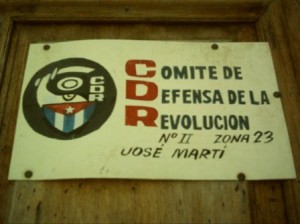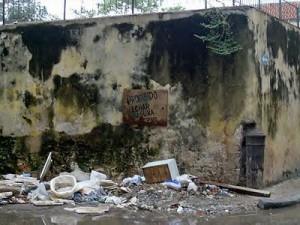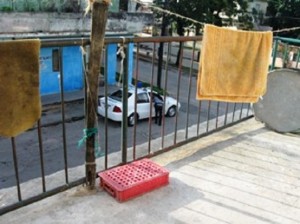 Two signs about 30 inches wide by six feet long were displayed by state officials in many offices and shopping centers in Havana and in other cities in Cuba. They both have the Committee for the Defense of the Revolution (CDR) logo. One says: “Caring for the neighborhood, vigilant and united”; and the other says, “Combative and united with the Fatherland.”
Two signs about 30 inches wide by six feet long were displayed by state officials in many offices and shopping centers in Havana and in other cities in Cuba. They both have the Committee for the Defense of the Revolution (CDR) logo. One says: “Caring for the neighborhood, vigilant and united”; and the other says, “Combative and united with the Fatherland.”
These signs are dedicated the “official holiday” for the fiftieth anniversary of the Committees for the Defense of the Revolution, founded by Fidel Castro on September 28, 1962. His purpose was to persecute, betray and control the enemies of his government, then understood as collaborators of the former regime, but later expanded to include anyone suspected of speaking out against the decisions of the Maximum Leader.
From the outset, the CDR became a kind of Neighborhood Inquisition, with a management structure at national, provincial and municipal levels, in turn subdivided into Zones, urban blocks and rural villages; all ready to expose a neighbor, shout slogans, assign tasks and carry out the many directives and orders that might occur to the government mandarins and the single party.
For half a century the history of this grassroots organization has had a record of vileness impossible to calculate. Through it, many things became widespread: coercion at home, collective snitching, the “secret operational work of the police,” surveillance of the neighbors, family distrust, the mobilization of the people to mass political rallies, agriculture, health campaigns, acts of repudiation, and support for the so-called People’s Power elections.
With the CDRs the Castro regime acquired a “flexible entity” of unquestionable auxiliary value. Perhaps the secret purpose of its creation at a time of social disintegration was to make the people accomplices and hostages of their own repression and to harness them to “Revolutionary tasks.” This organization, decimated but visible, marked the lives of millions of Cubans, who still depend on the “endorsement” or “good opinion” of the president of their block’s CDR to obtain a local position, a job as a custodian or a grocer.
 To not belong to the CDR is a challenge that inscribes your name in bold type on the political police blacklist. Whoever says “No” when they knock on the door falls out of favor, however much of a “combatant” they may have been, however virtuous or humane. Failure to pay your CDR dues or to attend their worthless meetings is equivalent to untying the strings of the lackluster Revolutionary fanfare, whose icons continue on despite the passage of time, along with the police reports and the dependence of thousands of unfortunates who felt important before “the call of the Fatherland.”
To not belong to the CDR is a challenge that inscribes your name in bold type on the political police blacklist. Whoever says “No” when they knock on the door falls out of favor, however much of a “combatant” they may have been, however virtuous or humane. Failure to pay your CDR dues or to attend their worthless meetings is equivalent to untying the strings of the lackluster Revolutionary fanfare, whose icons continue on despite the passage of time, along with the police reports and the dependence of thousands of unfortunates who felt important before “the call of the Fatherland.”
 The CDRs are as discredited as the Cuban Workers Center (CTC), the only labor union allowed, the Federation of Cuban Women, the Association of Combatants, and other organizations that move no one, but which play a role in the bureaucratic structure of a regime that came to power in the name of freedom and eliminated all the rights and freedoms of citizens.
The CDRs are as discredited as the Cuban Workers Center (CTC), the only labor union allowed, the Federation of Cuban Women, the Association of Combatants, and other organizations that move no one, but which play a role in the bureaucratic structure of a regime that came to power in the name of freedom and eliminated all the rights and freedoms of citizens.
Now that the government is dismissing half a million people, the CDR leaders will explain the need for a “labor adjustment” as if they were idiots invited to the table of power. Many will eat the soup on the 27th, waiting for the 28th, with their hands in their pockets wondering when they will return to work. Perhaps with the help of the CDR, that takes care of the neighborhood, “combative, vigilant and united for the Fatherland,” just like in 1962. Congratulations!
October 3, 2010
